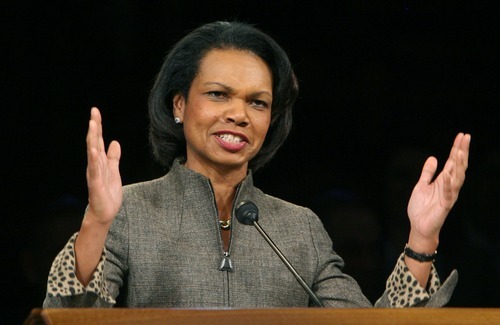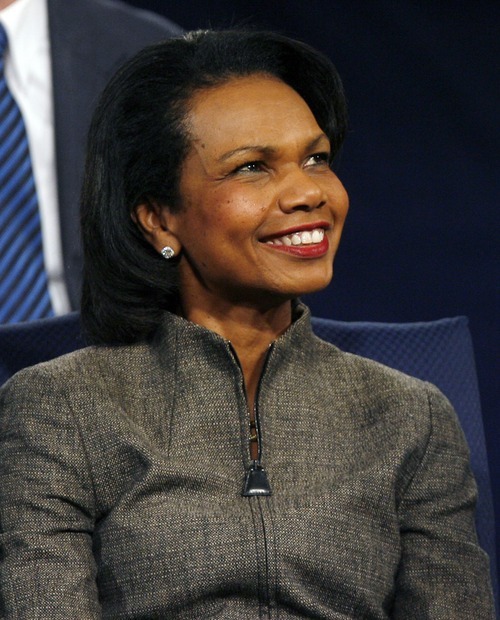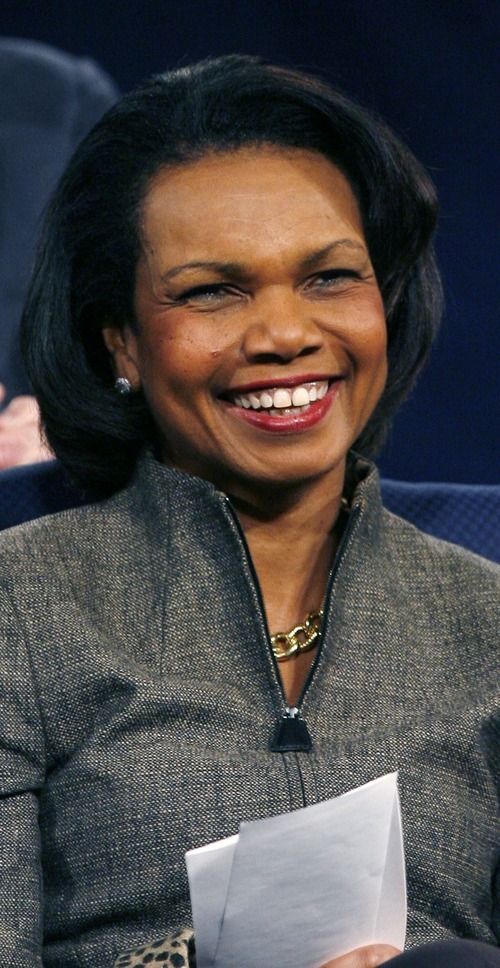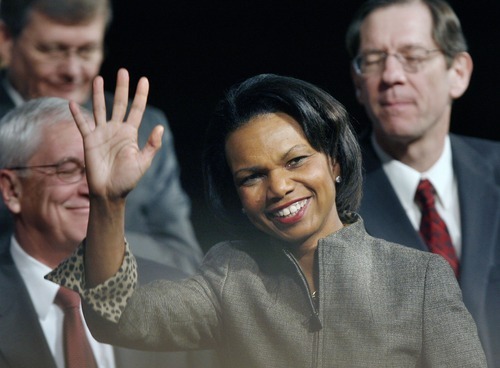This is an archived article that was published on sltrib.com in 2011, and information in the article may be outdated. It is provided only for personal research purposes and may not be reprinted.
Provo • She may have been pivotal in selling the war in Iraq, but Condoleezza Rice also believes we should defend the country by arming school children with musical instruments.
In a speech to more than 17,000 students at Brigham Young University on Thursday, the former secretary of state identified the "disastrous state" of public education as a threat to national security.
Education standards must rise to insure the next generation is employable in a global economy, Rice told an audience that filled much of the Marriott Center. And returning arts and music to the classroom would help.
"They need the arts," said Rice, who began playing piano at age 3. "When I hear music called an 'extracurricular activity,' it makes me cringe because it's part of becoming a well-rounded human being."
A scholar of international politics, Rice, 56, is back at Stanford University, where she once served as provost, after eight years in the second Bush Administration, first as national security adviser then as the nation's top diplomat. The classically trained pianist performs Friday in Park City with the Muir Quartet.
Rice spoke at BYU as part the Mormon Church-owned school's weekly forum, usually shown on BYU's TV network. But Rice's handlers barred live broadcast of her remarks and allowed video and still photography only during the opening minutes of her address. No audio was permitted.
BYU referred questions about that to Washington Speakers Bureau representative Liz Morrison, who did not respond to an e-mail query. The school declined to divulge what Rice was paid but The Hill, a Washington, D.C.-based daily magazine, reported in April 2009 that she was getting fees of up to $150,000.
Thirty protestors marched up University Parkway during Rice's speech, denouncing her role in the 2003 Iraq invasion and the development of "enhanced interrogation techniques" many regard as torture.
"She lied to get the country into a war that killed 600,000 to 1 million Iraqis," said organizer Will Van Wagenen, a 2003 BYU graduate who holds a master's in theology from Harvard. "She was part of an administration that imprisoned and tortured thousands. That's contrary to the basic principles of Christianity and Mormonism and that means being a peace maker and loving your enemy."
Inside the near-packed arena, however, students gave Rice a warm reception and sang the hymn "Rejoice, the Lord Is King" to open the event.
"It was phenomenal," said Jaime Christensen, a comparative literature major. "I really liked what she said about optimism and education and finding your passion. Music is important."
Rice recently published Extraordinary, Ordinary People, a memoir of growing up black in segregated Birmingham, Ala. The book details the transformative impact of education and faith on her parents, both teachers and Presbyterians, and her grandfather.
What sets America apart is the idea that where people come from doesn't matter as much as where they are heading, Rice said, suggesting it should be a source of national pride that so many people aspire to immigrate to America.
"We want people who are energetic and ambitious to come here and be a part of us," she said. But educational excellence is vital to maintaining U.S. stature. "We are not held together by religion, blood or even nationality. We are held together by an idea and a promise."
The country must also help heal failing states before they incubate new terrorist threats, Rice said, noting that the Sept. 11 attacks did not come from a competing power.
"It came from a weak failed state called Afghanistan," she said. "If we abandon Afghanistan again we will pay for it."
Rice never mentioned Iraq, but she did discuss the controversial invasion in a Q&A with students. Rice has been much criticized for justifying the war on the now-discredited premise that Saddam Hussein had nuclear capabilities. But she cautioned that it is hard to predict what will result from controversial decisions made in tough times. She pointed to the peaceful fall of Soviet communism, which few predicted, and her predecessor William Seward, who negotiated the purchase of Alaska in 1867. History has deemed the acquisition a great accomplishment, but at the time it was ridiculed.
"Why would you want to give $7 million to the czar of Russia for that icebox?' That's what they called it," Rice said. "Today's headlines and the judgment of history are rarely the same."















